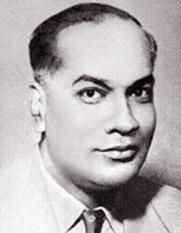RAILWAYS ROARED WITH RAMPALA
The Institution of Engineers, Sri Lanka (IESL), the apex body for the
engineering profession in the country, will commemorate the 102nd birth
anniversary of the late Eng. B. D. Rampala with a memorial lecture at
the IESL Headquarters at 120/15, Wijerama Mawatha, Colombo 7 today,
November 14, 2012 at 5.15 pm. This year’s memorial lecture will be on
‘Engineering Transformation – The Role of Engineers in Transformation’.
to be delivered by Eng. Mangala P. B. Yapa – Managing Director/CEO of
Colombo Dockyard PLC. We are living in an era of rapid changes where
technological breakthroughs from diverse fields and disciplines are
being intelligently integrated to obtain sustainable synergies between
flexible usage, comfort and security besides traditional features of
energy efficiency, environment friendliness, etc. in goods and services.
Solutions that change and adopt to the users comfort by being sensitive
to real time changes in requirements of the consumer have led to the
advent of route-optimized transport systems, system-optimized smart
grids, consumption-optimized smart buildings, etc..
 |
|
Eng. B. D.
Rampala |
The common challenge to all professions is thus for practitioners to
go beyond there respective boundaries in acquiring reasonable working
skills on other disciplines as well for the proper utilization of such
integrated systems.
The engineering profession, in particular, is an all pervading
profession. Its influence is felt in almost all spheres of human
activity. Engineering systems, products and utilities have become so
much part and parcel of everyday life that their interruption brings
life as we have come to know almost to a grinding halt. Furthermore,
user sophistication demands engineering techniques, materials, designs
and controls being used be exponentially renewed to provide increased
flexibility, comfort and security promised by new technology to people
all over the world.
Great engineers
It’s in this context that the theme of this years late Eng. B. D.
Rapala Memorial Lecture ‘Engineering Transformation – The Role of
Engineers in Transformation’ should be viewed in relation not only to
rapid technology changes that are taking place but also to the
transformation of the mindset of engineers in the country.
Understanding engineering as a profession for improvement of the
standard of living of the people, being receptive to change as an engine
of improvement of standard of living of people, understanding of the
interactions involved in bringing about successful change in keeping
with modern aspirations of the people are among the many aspects that
have to be dealt with on the subject.
Sri Lanka has a proud engineering legacy in that great engineers in
the past have already established the intellectual potentials of the
country’s engineers. One such engineering who not only brought bold
changes but also had foresight and determination to ensure their
long-term sustainability is late Eng. B. D. Rampala who became the first
native Chief Mechanical Engineer in 1949 of the then Ceylon Government
Railways and went on to become its General Manager during the period
1955 – 1970.
Born on November 14, 1910 in Pannipitiya Rukmale, he received his
education at Nalanda College Colombo and Ananda College Colombo.
Having completed his engineering apprenticeship in 1934 at Colombo
University College, he joined Ratmalana Railway Mechanical Engineering
Department of the then Ceylon Government Railway (present Sri Lanka
Railway).
Major destinations
He was appointed as Chief Mechanical Engineer of the Railways in
1949. Major railways around the world were upgrading from steam
locomotives to diesel at this time and B.D Rampala lost no time in
submitting his proposal to dieselize the Sri Lanka Railways, and in
1953, the first batch of diesel locomotives arrived from Brush Bagnall
of the United Kingdom.
More importantly he made immediate modifications to the locomotives
when they developed problems in their introduction to existing
conditions. B.D Ramapla’s modifications won approval and praise from the
British builders who later evaluated those modifications against their
original design.
Rampala Memorial Lecture today
He further submitted a paper on his observations to the Institution
of Locomotive Engineers in London, which gave him full praise. Rampala
was appointed as the General Manager of the Sri Lanka Railways in 1955.
He is credited with the launching of express trains to major
destinations within the country;named trains, like the Yal Devi, Udarata
Menike Menike and Ruhunu Kumari. B.D. Rampala replaced the age old Lock
and Block signalling system with an electronic colour signalling for the
busiest portions of the railways in 1959.
Train movements were thereafter controlled by a Centralized Traffic
Control panel at Maradana, greatly improving safety. In 1956, the
Institution of Locomotive Engineers in London commended Rampala as the
Best Diesel Engineer in Asia. His demise on June 20, 1994 at the age of
84 ended a significant chapter in the history of railways in the
country.
The life and achievements of Late Eng. B.D. Rampala should be
exemplified as an agent of sustainable change to the country in this
modern era of advances from diverse disciplines and fields being
integrated into more meaningful changes should therefore be taken in its
spirit for the improvements to human well being it could bring which
goal the great engineer strived for in his lifetime. |





